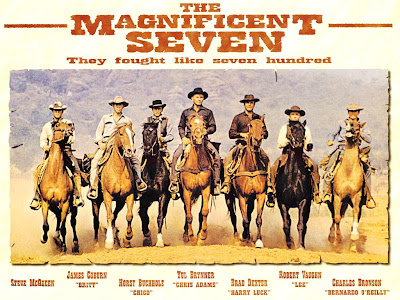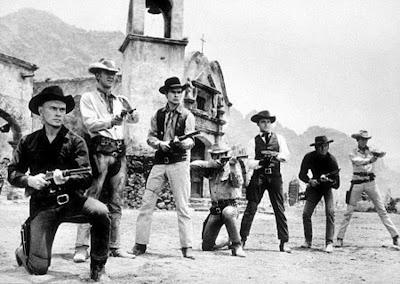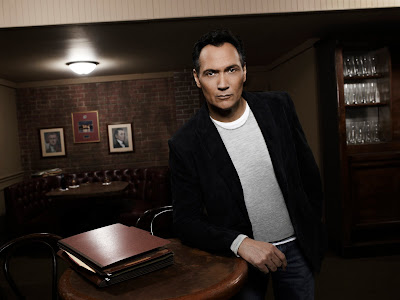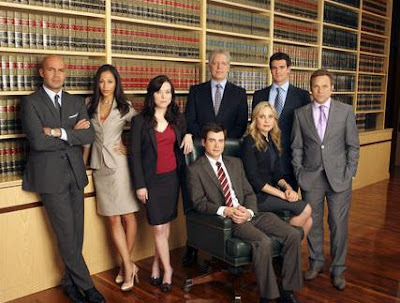Legal Lessons from The Magnificent Seven (1960) on its Fiftieth Anniversary
 [Editor’s Note: This coming Saturday, October 23, 2010, marks the fiftieth anniversary of the release of the classic Western movie, The Magnificent Seven, which starred Yul Brynner, Robert Vaughn, Charles Bronson, James Coburn, and of course, Steve McQueen. Directed by John Sturges, the film was based upon the 1954 Japanese film, Seven Samurai, directed by Akira Kurosawa. To celebrate this occasion, we here at Abnormal Use asked our boss – senior partner Mills Gallivan – for his thoughts on the film and lessons we can learn from it as lawyers.]
[Editor’s Note: This coming Saturday, October 23, 2010, marks the fiftieth anniversary of the release of the classic Western movie, The Magnificent Seven, which starred Yul Brynner, Robert Vaughn, Charles Bronson, James Coburn, and of course, Steve McQueen. Directed by John Sturges, the film was based upon the 1954 Japanese film, Seven Samurai, directed by Akira Kurosawa. To celebrate this occasion, we here at Abnormal Use asked our boss – senior partner Mills Gallivan – for his thoughts on the film and lessons we can learn from it as lawyers.]
“If God didn’t want them sheared, he would not have made them sheep.”
If you are familiar with this quote then you are probably a fan of Westerns and, in particular, The Magnificent Seven. This cult movie is on most, if not all lists of the Top Ten Westerns ever made. This week marks the fiftieth anniversary of the film’s American release. The movie was originally released in Europe and was so popular that it was re-released in America and immediately became a huge hit and financial success. The musical score for the movie was composed by Elmer Bernstein and nominated for an Academy Award in 1961. The theme song is stirring and has been used in numerous other movies, musical compositions and ads, including the old Marlboro commercials. Anyone over the age of fifty would immediately recognize it.
The movie is inspiring as you watch a small band of dedicated professional gunmen take on huge odds in the defense of a hapless Mexican village. I recently read about a college football coach who shows the movie to fire up his team the night before each game. Throughout his career, he has now shown it over 500 times to his various teams.
The quote above is from Calvera, the bandit who regularly pillages a small village in Mexico. He is speaking to the members of the Magnificent Seven, and trying to talk them out of defending the villagers, who he sees as his sheep. His is a great rationale if you are a bully and a thief! As you might expect, this argument does not persuade the seven professionals who have taken the job on a matter of principle. Consider the following exchange between Chris (Yul Brynner) and Vin (Steve McQueen), the two leaders, about their commitment:
Chris: You forget one thing. We took a contract.
Vin: It’s sure not the kind any court would enforce.
Chris: That’s just the kind you’ve got to keep.
 So what does this have to do with products liability law?
So what does this have to do with products liability law?
Oftentimes, corporate defendants in products cases feel much like the villagers in the movie, victimized, bullied and about to be sheared. Certainly, the villagers are much more vulnerable and sympathetic than a corporate defendant. However, the often perceived motivation of the plaintiff’s trial bar is sometimes very similar to that of the bandit Calvera. This motivation can be greed, which is fueled by money and power. One has only to look at the tragic demise of the now infamous trial lawyer Dickie Scruggs to understand that for some plaintiff’s lawyers, justice is not the ultimate goal. Scruggs plead guilty to mail fraud and bribery and when Judge Glen Davidson imposed his sentence he quoted William Barclay, a Scottish philosopher, who said, “The Romans had a proverb that money was like sea water. The more you drink the thirstier you become.”
So what makes The Magnificent Seven magnificent? I like to think it is their courage in the face of insurmountable odds and their unwillingness to cut and run when given the opportunity. One definition of magnificent is noble, and these hired guns see their salvation in taking up the noble defense of the villagers. They are determined that Calvera will not shear the villagers again without paying a heavy price. The bandit releases them after the first skirmish, thinking that they really are not willing to die for peasants who can not pay them and who will not fight for themselves. The concept of a noble cause also resonates with good defense trial lawyers; as a group we believe in our clients’ positions, seek justice and will not be intimidated by an adversary or judicial hellhole. Calvera underestimated the commitment of the men he faced and it was a huge mistake.
Shortly after being released and ordered back across the border to Texas, James Coburn’s character Britt foretells the final showdown when he says: “Nobody throws me my own guns and says run. Nobody!”
A capable plaintiff’s lawyer will not underestimate the defense legal team, or at least, not more than once. So when you are in a battle to defend your products and keep your company from being sheared, where do you turn? After fifty years, six of the members of the Magnificent Seven are dead, and the lone survivor Robert Vaughn (Lee) is an actor not a lawyer.
When it is all on the line, you need defense trial attorneys with consummate skill, integrity, courage and a willingness to fight to the last barricade. Lawyers who know that ultimately justice can and will prevail and who are not afraid to say to the Calveras of the world:
Calvera: Somehow I don’t think you’ve solved my problem.
Chris: Solving your problems is not our line.

















